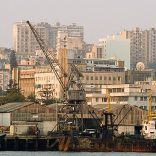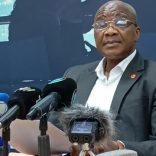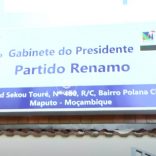Mozambique: Predictable environment for foreign investment is crucial, says Chapo
Mozambique demands return of artefacts looted during colonialism

Photo: AIM
The Mozambican authorities are demanding the restitution of at least 800 artefacts looted during colonialism. This is part of a continental movement demanding the restitution of African material and cultural assets, the number of which is estimated at around 3,000, inventoried since 2020.
“Historical reparations are also made through symbolic and cultural means, which is why we are organising ourselves to discuss how we can appropriate what was stolen from our country and across the African continent,” said Minister of Education and Culture Samaria Tovele in Maputo this Sunday (25-05) during the celebrations of Africa Day.
Tovele stressed that the union of all Africans in the construction and, above all, in the alignment of policies that can promote and guarantee reparations to the African peoples who were colonised for many years.
“Today we are free, but we need to recover everything that was stolen from the African continent. Hence the choice of the motto for the celebration of Africa Day: “Justice for Africans and people of African descent through reparations”.
According to the Minister of Foreign Affairs and Cooperation, Maria Lucas, the issue of reparations for Africans and people of African descent also involves reparations for deportations, mass massacres, arbitrary detentions, torture, looting of natural resources and nuclear tests with catastrophic human and environmental impacts during the colonization period.
Given its complexity, delicacy and sensitivity, the issue of reparations is classified as dynamic and cannot, therefore, be implemented only in 2025. Thus, the prospect of a possible decade of reparations for the damage caused by slavery in Africa is envisaged, and Mozambique has its history duly documented. “On the other hand, the places from which our ancestors departed for distant and unknown lands, never to return to their origin, are equally preserved.”
“We have the Maputo fortress, which served as a transit point for thousands upon thousands of Mozambicans, transported and treated in the most degrading conditions and detrimental to human dignity on slave ships, which is why some of them did not reach unknown lands, having perished on the high seas,” the foreign minister added.
Regarding the theme of 2025, a roadmap was designed that includes academic and technical analyses, including seminars, symposiums, conferences, some of which will be held in the Caribbean and other latitudes, with notable Afro-descendants, which will culminate in the holding of an Extraordinary Summit of the African Union (AU), with the participation of some heads of state and government of the Caribbean community.
On the occasion, the minister highlighted the actions that the country will develop throughout the duration of term of the roadmap, through the Ministry of Education and Culture, such as holding lectures in schools, among other activities, with a view to raising awareness among students and society, through reparations, for the cultural, economic and scientific backwardness to which Africa has been subjected, resulting from degrading and inhuman practices, typical of slavery, colonialism and apartheid.
In turn, the ambassador of the Democratic Republic of Congo, Dean of the Group of African Ambassadors, Kola Beby, said that Africa is not only the cradle of humanity, but also the heart of world hope, therefore, he considers reparations a pillar of global justice, as well as an instrument of reconciliation with humanity, “and we welcome the excellent cooperation in this regard between the AU and the Caribbean Community (CARICOM), in particular with the preparation of their joint roadmap”.
The celebration of the event was marked by cultural activities and a gastronomic fair of typical African dishes, among others.












Leave a Reply
Be the First to Comment!
You must be logged in to post a comment.
You must be logged in to post a comment.